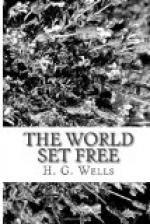It was not only from the novels that religion was omitted. It was ignored by the newspapers; it was pedantically disregarded in the discussion of business questions, it played a trivial and apologetic part in public affairs. And this was done not out of contempt but respect. The hold of the old religious organisations upon men’s respect was still enormous, so enormous that there seemed to be a quality of irreverence in applying religion to the developments of every day. This strange suspension of religion lasted over into the beginnings of the new age. It was the clear vision of Marcus Karenin much more than any other contemporary influence which brought it back into the texture of human life. He saw religion without hallucinations, without superstitious reverence, as a common thing as necessary as food and air, as land and energy to the life of man and the well-being of the Republic. He saw that indeed it had already percolated away from the temples and hierarchies and symbols in which men had sought to imprison it, that it was already at work anonymously and obscurely in the universal acceptance of the greater state. He gave it clearer expression, rephrased it to the lights and perspectives of the new dawn....
But if we return to our novels for our evidence of the spirit of the times it becomes evident as one reads them in their chronological order, so far as that is now ascertainable, that as one comes to the latter nineteenth and the earlier twentieth century the writers are much more acutely aware of secular change than their predecessors were. The earlier novelists tried to show ‘life as it is,’ the latter showed life as it changes. More and more of their characters are engaged in adaptation to change or suffering from the effects of world changes. And as we come up to the time of the Last Wars, this newer conception of the everyday life as a reaction to an accelerated development is continually more manifest. Barnet’s book, which has served us so well, is frankly a picture of the world coming about like a ship that sails into the wind. Our later novelists give a vast gallery of individual conflicts in which old habits and customs, limited ideas, ungenerous temperaments, and innate obsessions are pitted against this great opening out of life that has happened to us. They tell us of the feelings of old people who have been wrenched away from familiar surroundings, and how they have had to make peace with uncomfortable comforts and conveniences that are still strange to them. They give us the discord between the opening egotisms of youths and the ill-defined limitations of a changing social life. They tell of the universal struggle of jealousy to capture and cripple our souls, of romantic failures and tragical misconceptions of the trend of the world, of the spirit of adventure, and the urgency of curiosity, and how these serve the universal drift. And all their stories lead in the end either to happiness missed or happiness won, to disaster or salvation. The clearer their vision and the subtler their art, the more certainly do these novels tell of the possibility of salvation for all the world. For any road in life leads to religion for those upon it who will follow it far enough....




